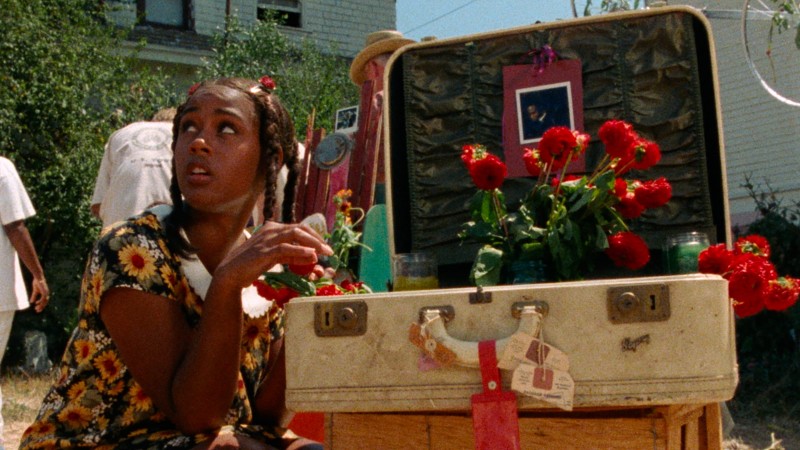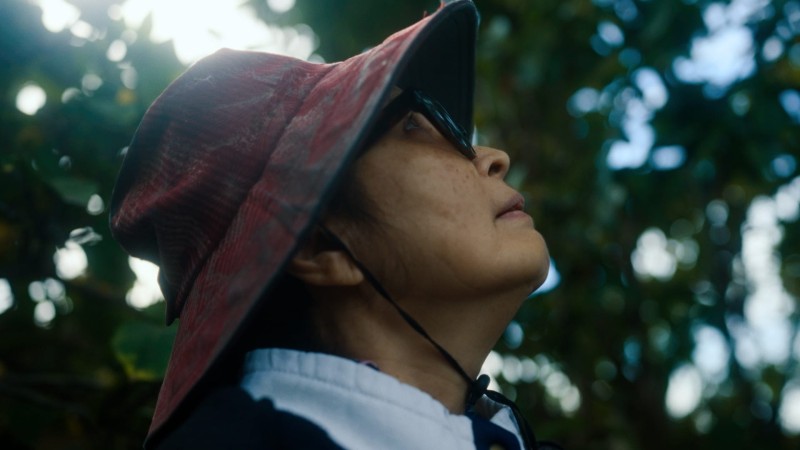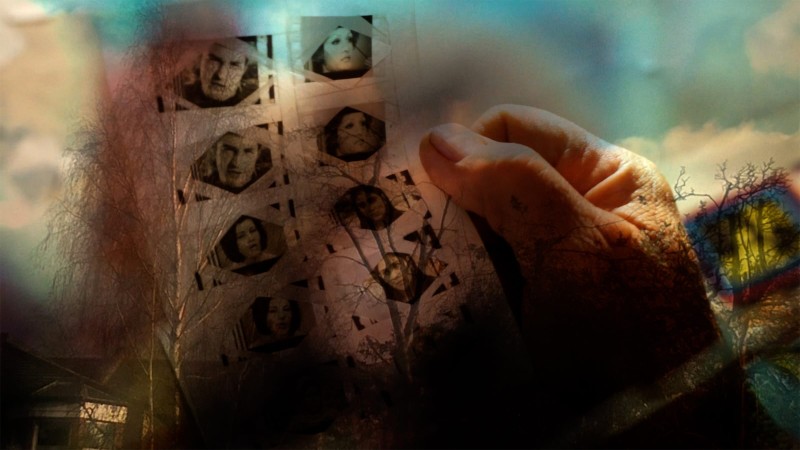Arnaud Desplechin on the Passionate Trance of Filmmaking

It’s always a great pleasure when spending time with an artist feels like being transported into his or her work, and when French director Arnaud Desplechin visited us recently, on the night before the New York Film Festival premiere of his latest film, My Golden Days, that is precisely what happened. Although he was soft-spoken and his demeanor was gentle when he walked in the door, after a glass of wine Arnaud exuded the same emphatic wonder and mile-a-minute brilliance that make his films so fascinating. From one sentence to the next he’d crack a joke that would have us blushing, then instantly follow up with a thought so moving you couldn’t believe it had rolled off his tongue with such ease. And just as it feels to watch his fiercely intelligent, deeply human, and emotionally energetic films, we wished the conversation would never end.
When you’re doing an interview, do you find that people always ask you the same questions?
Yes, but you have to be patient with that, you have to be tolerant. Obviously sometimes the questions are the same, but then sometimes you get a question that’s so specific, and suddenly you meet the guy with this one question, and it can be a very moving moment. Making a film is strange because you are putting things in the image, and as soon as you see it you say, “No, I have to hide it because it’s too obvious.” You add a prop or a detail in the costume or a thing in the makeup, and I have to ask the DP, “Don’t shoot it, they’ll see us.” It’s a difficult job, to bring something on the set, and then hide it in the process. It doesn’t happen that often with spectators, but it happens with journalists, that suddenly they notice a detail that you have hidden so well, and then you feel proud because you think, “I did my job, they caught it.”
What’s your favorite part of the filmmaking process? Do you love the writing?
No, writing is the worst possible part! You’re alone. That is, I don’t work alone—I’m always working with pals—but you hate that pal who’s writing with you. After two weeks you want to kill him—the pure hate, the hatred for the cowriter. No, it’s a nightmare, it’s a lot of loneliness, and it’s haunting. When the writing is good, it’s good, but you have to work so hard to find a good punch line.
The prep is the part that I like. For me that’s the most fascinating part of the process, because everything is possible. You have the text, this text you wrote in suffering, and now you can open the text. You are meeting all these actors and everything is possible. Have you read Hitchcock at Work? It’s a very simple book. It’s just details about filmmaking, how he planned the thing, how he built the set, where he improvised a line. It’s a very good book.
But isn’t prep also the time when you find out what isn’t possible?
Yeah, if you see the rainy side of the street, but if you see the sunny side of the street, it is possible. I’m a director on location. I’m not a studio director; I’m not able to do that. I respect that, and there are some directors I worship who direct in studios. But on location you can discover all these possibilities that real life brings to your film. If you don’t find the place that you needed, you discover an angle on another set. If there’s a small thing that you didn’t plan or a scene doesn’t work, you write new lines that you can add in the script. It becomes real. On the set it’s a different thing, it’s an involvement, it’s a sport, it’s an act.
So when you’re preparing a film you also imagine the experience of shooting it?
Yeah, I’m trying to fix all the angles and be ready—just opening the text and all its possibilities. So this would be my advice to young directors: Work seriously on the prep, because that’s the moment where you have to learn your film, to be the student of it—not to be the teacher. To let the film teach you and to learn to say, “Oh, this is what the scene is missing.” You have to be open to what the text can teach you and be a student again. That’s why it makes me so happy. You can’t be a student during the shooting, during the shooting you have to be the boss.
It sounds like one of the things you enjoy most about the process is being surprised by how the actor interprets the script, and yet you so often work with the same actors. Is that because you know they’re going to surprise you in an interesting way?
I’ve worked with the same actors a few times, but there are always newcomers. So it’s a troupe, but its function is to be open, anyone can be a part of it. The pleasure of it is that it has to change all the time, it’s not closed.
Still, the anxiety increases from film to film, mainly with Mathieu [Amalric].
What kind of anxiety?
That I will disappoint him.
Just that you will disappoint him, or also that he might disappoint you?
Both.
Do you tell each other that? Do you have that conversation?
Yeah, but Mathieu is hard with me. He’s really hard. You don’t know all his French films, but I saw all his French films. He always plays the same part in all the films. They’re quite good, but I remember when I proposed Kings & Queen to him, he told me: “Arnaud, the script is great, but I don’t want to play the same character as in My Sex Life. You have to prove to me that this is another character.” I have to prove to you? Come on, you play the same character in five films, why am I obliged to prove that to you? He said, “Because it’s love, so you have to prove it.” On My Golden Days he really surprised me. Come on, he has just three moments in the film and he’s the heart of the film! At the end you just cry with him. It’s a heartbreaking performance he gives. I think I was not too bad, I surprised him here and there.
So your relationship with Mathieu is your most intimate with an actor.
Yeah, but there is a specific relationship I have with female actors. It’s different, it’s a thing when I’m writing. When I’m writing about a main character, I love to put in, even in a sparse way, a narrator. So when I’m writing a male character I write, “He wants to go to Africa, but now he’s a widower,” or whatever. But when I’m writing a female character I write “I.” At last I can write, “My name is Nora Cotterelle, I’m thirty-five years old,” like in Kings & Queen. I love that, to speak as a woman, I love that. To speak as a man, eh.
So when you’re making a film, do you watch other films during the process?
I watch films while I’m working and I show them to actors, but always the same films. Well, not always the same, but at my age I know my repertoire, I know what’s in my trunk.
What’s in your trunk?
Lars von Trier.
Who knew! What films of his, exactly? There’s such a large body of work.
I admire him. When I was working on My Golden Days, and working with very young guys and girls, it was very frightening. When you’re more than fifty and you’re discussing—with a girl who is seventeen years old—making love, and in very precise terms, about how nude you will be and what exactly you will be doing. So I said, let’s start with Breaking the Waves. I’m quite shy, and Lars von Trier is quite gutsy, so I will not ask them to do that, but let’s see the involvement and how fair they are with their parts, how human they are, and how humble they are—not because they are being noble but because by being human they are noble. Plus, the love story in the first fifteen minutes of the film is wonderful. It’s an amazing film. So I said, “Okay, you’re younger so I won’t ask you to go that far, but let’s see together how far we can go and how proud we can be to go that far.” So Breaking the Waves has been a great tool. Also, perhaps being so old and speaking with people so young, I didn’t know how to use the words or which kinds of words to choose. So then you can show a scene and say, “That’s what I mean.” So I showed when they marry, I showed the first time they make love, and the first time she sees his nudity. That’s an American way of saying it.
What’s the French way of saying it?
Looking at his dick.
So what else is in the trunk?
Truffaut, always.
For the writers?
For the writers, but from time to time it can be useful for the actors.
What Truffaut do you go back to?
Mississippi Mermaid, specifically when Jean-Paul Belmondo is on the roof and he’s explaining: “You have been so crucial to me, and perhaps it’s bad, perhaps it would have been better if I’d met a girl less important in my life than you.” Truffaut said that French people don’t like Jean-Pierre Léaud because he is not virile—he’s an American actor—and actually he was right. In France we have great actresses—Charlotte Gainsbourg being the most impressive of them today—and we have so many of them, but to be a great actor, an actor who will be accepted by American audiences, is not that easy. We have Mathieu Amalric, yes, I have him! But we don’t have that many. To accept the fact that as a man you will disappoint people with the fact that you are a man.
I’m always thinking about John Wayne; John Wayne is beautiful like a woman. You can see how his manhood is fragile—he’s accepting something fragile. This is something I love in the American way of acting. The common idea is that male actors are all like Arnold Schwarzenegger, too much or clichés, but actually when you look at the acting of John Wayne, there’s no cliché in that. That’s what I love about Jean-Paul Belmondo’s performance in Mississippi Mermaid—he’s not playing the stupid, triumphant male thing, he’s playing a wounded man. And this ability to play wounded man is something, to me, which is more American, which breaks my heart.
You have a great tradition of male actors in France, it’s just that you only have one at a time.
But there’s just very few of them, when in America you have dozens of them, or more than that! In the same generation you have all these actors, it’s really striking. I’m not sure that in many countries you can produce so many male heroes and wounded figures and interesting ways of being on earth. In the Chinese cinema, yes, you have great guys—but maybe three? In America you have thirty. It’s a very American art of acting that produces all these wounded heroes. It’s part of your tradition through Stanislavski, through Strindberg, or your literature. I don’t know where it comes from, but it’s something that is striking to me as a European.
So who are these Americans, these great wounded heroes?
Let’s be flat and stupid and talk about the Oscars. Birdman won the Oscar—so, in there you have these two great performances. One is Michael Keaton’s, being so embarrassed with himself, and he’s doing something so incredible. Everyone will remember the scene in the underwear. But the whole performance is about embarrassment, suffering, and how it is when you are sick of yourself. It’s terrible, it’s such a pack of suffering, and it’s beautiful and difficult to look at at the same time. Then you see the triumph of Edward Norton, being so shiny, he can do anything. You can see these two performances just in one film, and it’s amazing to have these two male parts that are opposite each other—one embarrassed with himself and the other so easy and comfortable with everything. It’s beautiful, it’s a beautiful American art. Even if the film won the Oscar, which usually is considered a shame, I think it’s great.
So you love the prep, hate the writing, and what about the actual shooting and being on set?
Shooting is a trance.
Do you remember it after?
No, I’m just doing what I have to do. I’m killing who I have to kill, I’m doing the job. It’s a trance, so I don’t remember. But there is a thing that I love to think about my job. I’ve been a technician, and after that I was an assistant to the editor and after that I was a DP and after that I was sound recorder. I did everything. So when I’m directing a film I respect all the jobs in the crew. And I think—and in a way this is a French way to think about it—I’m the only one who’s useless, and it’s great because they need me. They need someone who is absolutely useless. They could do the film without me, but they need me all the time. I’m not a good actor, I was a bad DP, I was a quite good editor but I prefer my editor, and they need me because they need someone who is useless to make it work. To me, that’s what it is to be the boss. It’s a strange position to inhabit, and to feel comfortable with that and stop worrying about your skills. Okay, I can’t be an actor, but I know how to help you. I’m a terrible DP, but I know how to help you to be a better DP. I know how to help people, so I love this function—but I experience it as a trance. That’s why I don’t have a recollection of it, I just experience it.
Editing you enjoy?
Yeah, it’s melancholic.
Do you already know the film when you enter the editing room?
I did that in my first film. On my first film it was very important for me, to show my skills. Then I did the same thing on My Sex Life but in a different way, and then I started to be bored with that and bored with me. I started to be more interested in my actors. So today, on the set, the first thing I do is a master shot, which is really clever—believe me, I’ve been a DP. So, with the track and everything in one movement, and it’s perfect, and I want to impress the crew, stupidly. “Ha, you see, I can do it!” But then I think, yeah, there was a glimpse here that was beautiful between the girl and the boy and I’m starting to ruin my own job trying to catch all these sparkles that are happening during a scene. So in a way, during the morning I try to be clever and during the afternoon I ruin all my work just to get wonderful moments. Then after that, on the editing table, I tell the editor, “I don’t want anything as I planned, just give me your best stuff, the moments that are pure and true.” I don’t care about the way I shot it, now what I want to show to the audience are the best performances, the moments where the characters reveal themselves, and I’m willing to ruin my way of shooting to get these precious moments. It seems to me now that this is something I stole. Miloš Forman works that way. When you look at his first films, the way they’re shot is amazing, and then he started to be so accurate and close to the details. So, whatever about the master shot, who cares—to have all these facets started to be more important than to have one nice moment.
How do you then know when a film is finished?
I guess when I’m sick of it, when I’m not able to improve it any more, and you know it, physically you know it. You know that you have no more ideas, so you go to the producer and say, “Sorry about that.” When I don’t have ideas anymore it means that the film is finished, and that’s why I’ve never been a spectator of any of my films.
You’ve never watched one of your films all the way through?
Never.



